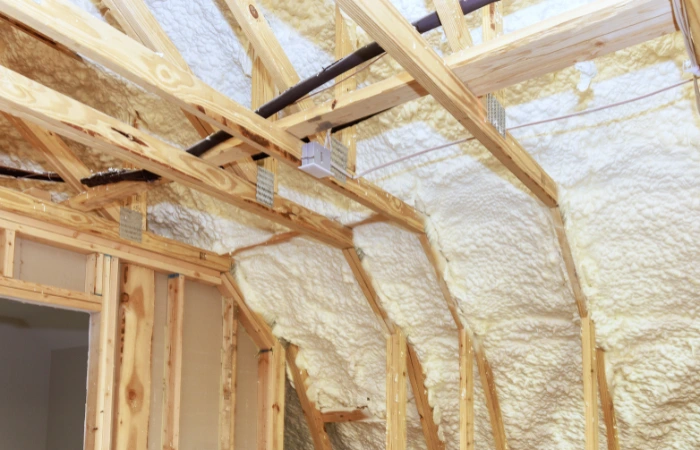Are you curious about the impact of open cell spray foam insulation on your roofing? You’re not alone. This article delves into the facts to dispel any concerns about potential damage. We’ll explore how this type of insulation works, its benefits, and, most importantly, whether it poses a risk to your roof’s integrity.
By understanding the properties of open cell spray foam and following proper installation guidelines, you can ensure your roofing remains protected without the worry of rot or damage. Let’s dive in and uncover the facts straight.
What Is Open Cell Spray Foam Insulation?
Open cell spray foam insulation is a type of insulation material commonly used in buildings. It is composed of tiny cells that are not entirely closed, allowing air to fill the spaces within the material. This results in a softer and more flexible foam compared to closed-cell spray foam.
Open cell foam is typically less dense and offers some soundproofing qualities along with thermal insulation. It is often used in interior walls, ceilings, and attics for its cost-effectiveness and versatility.
So, Will Open Cell Spray Foam Insulation Really Rot Your Roofing?
No, open cell spray foam insulation is designed to be breathable, letting air and moisture pass through, which helps prevent water accumulation and the risk of roof rot. The breathable nature of this insulation is crucial for timber ventilation, ensuring that the roof structure remains dry and less susceptible to decay. When installed correctly, spray foam insulation acts as a protective barrier without causing harm to the roofing system.
Tips to Prevent Spray Foam Insulation Causing Damage to Your Roof

Spray foam insulation is a widespread choice for many homeowners due to its effectiveness in sealing air leaks and providing thermal insulation. However, it’s important to install it correctly to prevent potential damage to your roof. Here are some tips to help prevent spray foam insulation from causing damage to your roof:
1. Professional Installation
Ensure that spray foam insulation is installed by qualified professionals. Improper installation may lead to overapplication or uneven distribution, potentially causing roof damage. Trained technicians understand the correct thickness and application techniques to prevent issues.
2. Moisture Control
Prioritize moisture control measures before installing spray foam insulation. Moisture trapped beneath the foam can lead to mold growth and structural damage. Implement proper ventilation and address any existing leaks to maintain a dry environment.
3. Roof Inspection
Conduct a thorough roof inspection before applying spray foam insulation. Identify and fix any existing issues, such as leaks, weakened areas, or deteriorating materials. A sound roof foundation ensures compatibility with the insulation material.
4. Use Compatible Materials
Select spray foam insulation materials that are compatible with your roofing system. Incompatibility can result in chemical reactions or excessive expansion, leading to structural damage. Consult with professionals to choose the appropriate insulation for your specific roof type.
5. Avoid Overapplication
Over-applying spray foam insulation can exert excessive pressure on the roof structure. Follow manufacturer guidelines for the recommended thickness and application rates. Overapplication may compromise the integrity of the roof and lead to long-term damage.
6. Prover Ventilation
Ensure proper attic ventilation to contain heat buildup and condensation issues. Inadequate ventilation can cause temperature differentials that may affect the performance of spray foam insulation, potentially leading to roofing problems. Adequate airflow helps maintain a stable environment.
7. Regular Maintenance
Implement a routine maintenance schedule for both the roof and insulation. Frequent inspections allow for the early detection of issues such as leaks, damage, or pests. Timely intervention can prevent minor concerns from escalating and causing more significant damage.
8. Consider Climate Factors
Account for regional climate factors when installing spray foam insulation. Extreme temperature fluctuations, high humidity, or frequent storms can impact the performance of the insulation and the roof. Choose insulation materials and installation techniques that align with the specific climate conditions of your location.
Frequently Asked Questions
How much does open-cell foam cost?
Open cell foam insulation typically costs between $0.45 and $0.65 per board foot. The industry uses board feet as the unit of choice, where one board foot equals 144 cubic inches. This pricing range reflects the cost per unit of insulation, making it easier to estimate expenses for insulating various areas in residential and commercial buildings.
What is the R-value of open-cell foam?
The R-value of open-cell foam insulation is approximately 3.7 per inch. This value indicates its insulating capacity, with higher values suggesting better insulation. Open-cell spray insulation is known for its effectiveness in controlling airflow and reducing energy costs in buildings.
How thick can you spray open-cell foam?
Open cell foam insulation is recommended to be sprayed 6 to 10 inches thick on a roof deck or ceiling for optimal insulation. In walls, a thickness of 3 inches is typically recommended. This thickness helps maximize the insulation’s effectiveness in controlling airflow and reducing energy costs while maintaining structural integrity.
Conclusion
It is clear that open cell spray foam insulation, when properly installed, poses no risk of rotting your roofing. Its breathable nature allows air circulation, preventing water accumulation and safeguarding against roof decay. By prioritizing professional installation, moisture control, roof inspections, and routine maintenance, homeowners can enjoy the benefits of this insulation without compromising their roof’s integrity. Choose wisely, follow guidelines, and rest assured that open-cell foam can efficiently protect your home.
At Tropic Air Conditioning Inc., we can enhance your home’s comfort and efficiency with our expert attic insulation services. Let us help you optimize your insulation for a cozier, more energy-efficient space. Contact us today




